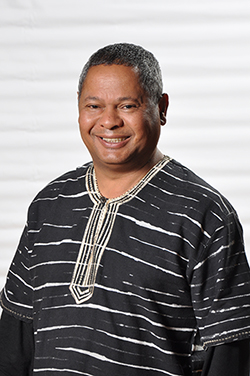Latest News Archive
Please select Category, Year, and then Month to display items
13 January 2020
|
Story Eugene Seegers
|
Photo Anja Aucamp
 Spearheading the digital expansion of the conversational Sesotho course is IDEAS Lab Director, Johann Möller (middle). With him are from the left: Prof Pule Phindane, CUT; Dr Brenton Fredericks, CUT; Bahedile Letlala, UFS Department of African Languages; and Dr Elias Malete, UFS Department of African Languages.
Spearheading the digital expansion of the conversational Sesotho course is IDEAS Lab Director, Johann Möller (middle). With him are from the left: Prof Pule Phindane, CUT; Dr Brenton Fredericks, CUT; Bahedile Letlala, UFS Department of African Languages; and Dr Elias Malete, UFS Department of African Languages.
For many years now, the UFS has been offering a one-year course in conversational Sesotho for staff members; this can then be followed up with the one-year course in advanced conversational Sesotho. The conversational Sesotho for students in the Faculty of Education was introduced in 2018 at the UFS.
The Central University of Technology (CUT) needed a conversational course for its first-year students and approached the Department of African Languages for the development of such a course. Living as we do in a multilingual country; this additional language skill opens doors and often hearts as well.
Using instructional design principles
However, the need was identified by both CUT and UFS to present this crucial information in a way that would be more appealing to digital natives as well as to those less familiar with technology. The Department of African Languages on the UFS Bloemfontein Campus, together with relevant departments from the CUT, approached the IDEAS Lab located on the UFS South Campus, since they already have a reputation for being a specialist on broadcasting and repackaging curricular content for digital presentations. The IDEAS Lab provided technical advice and built the multimedia programme, which will help the user to hear and practice phrases in Sesotho, using instructional design principles. The course will be available to both staff and students belonging to the two universities.
Room for growth
Johann Möller, Director of the IDEAS Lab, says this pilot programme will give both institutions the opportunity to test the use of multimedia for language acquisition. He adds, “Language is extremely complex, and we would like to expand this learning aid in the future.” In fact, the original design has room for growth built into it.
To keep things simple for the user and the building team, it was decided to start out with only four potential everyday scenarios where a staff member would like to speak Sesotho: Firstly, how to greet other persons from different genders; secondly, potential scenarios one might encounter in the university environment itself; thirdly, how to deal with situations at a hospital; and finally, how to use one’s language skills at a filling station.
Pronunciation is key
Each scenario contains three to four conversations that the learner can revise, along with images and audio that illustrate the situation and assist with correct pronunciation. The system does not allow the user to progress unless they have listened to the pronunciations of the sample sentences or phrases.
Further reading material and vocabulary lists are also provided, with the result that people who are using the programme can learn at their own pace. The authoring software Articulate Storyline was used to build the individual scenarios and each conversation or lesson within it. The lessons are also not dependent on an internet connection; they can be downloaded onto a flash memory drive and used offline.
Prof Andre Keet to chair Ministerial Oversight Committee on Transformation
2017-07-14

Prof Andre Keet
Photo: Stephen Collet
Higher Education Minister Dr Blade Nzimande has increased from seven to 10 the number of members of the Ministerial Oversight Committee on the Transformation in the South African Public Universities.
In a government gazette published on 7 July 2017‚ Dr Nzimande appointed new members of the committee for a three-year term to be chaired by Prof Andre Keet, Director of the Institute for Reconciliation and Social Justice at the University of the Free State (UFS). Prof Keet is a returning member of the committee alongside former University of Fort Hare chancellor Dr Mvuyo Tom.
The purpose of the Ministerial Oversight Committee on Transformation in South African Public Universities is to monitor progress on transformation in public universities‚ serve as an expert advisory body and provide independent and external advice to the minister and the department.
The committee has been given 11 tasks‚ chief of which is to study and evaluate transformation plans and charters of all universities. It is mandated to use this exercise as a basis for the development of a sectoral transformation charter. It is also tasked with reviewing the annual reports of institutions on transformation and producing an annual report on the state of transformation in the higher education sector.
Prof Keet’s appointment comes at a pivotal time when transformation at universities has been at the heart of many debates in universities, government and broader society. Prof Keet said: “It is an honour and privilege to serve the sector at this level and in this capacity.”
The university is proud to have in its ranks a leader of such calibre who has also spearheaded transformation initiatives at the UFS through the Institute for Reconciliation and Social Justice over the past six years.